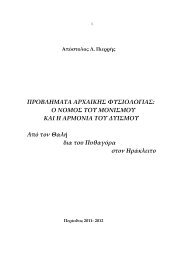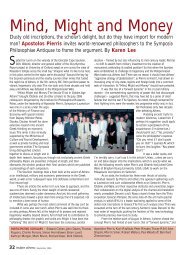Commentary on the Beginning of Damascius' De Primis Principiis
Commentary on the Beginning of Damascius' De Primis Principiis
Commentary on the Beginning of Damascius' De Primis Principiis
Create successful ePaper yourself
Turn your PDF publications into a flip-book with our unique Google optimized e-Paper software.
7apparently identifying <strong>the</strong> ἡνωμένον with <strong>the</strong> μονάς (not certainly since ἤτοι which R.reads c<strong>on</strong>fidently, is not really clearly seen <strong>the</strong>re), does not tell much against mysuggesti<strong>on</strong> since it is by a very later hand.On <strong>the</strong> o<strong>the</strong>r hand it should be noted that <strong>the</strong> positi<strong>on</strong> <strong>of</strong> μέν prohibits <strong>the</strong>above suggested train <strong>of</strong> thought; for we should have κορυφὴ τῶν μέν etc. And also<strong>on</strong> <strong>the</strong> suggesti<strong>on</strong>, <strong>the</strong> last clause καὶ τὸ ἓν ἔτι etc. has not <strong>the</strong> perfect point that ithas in <strong>the</strong> text as it stands. So, <strong>on</strong> <strong>the</strong> whole <strong>the</strong> suggesti<strong>on</strong> is to be rejected.c) Taking <strong>the</strong> example <strong>of</strong> <strong>the</strong> number, D. remarks that <strong>the</strong> unit c<strong>on</strong>tainsimplicitly and συνεπτυγμένως (not ἐν διεξόδῳ) all numbers, being <strong>the</strong>ir principle. Inthis way, <strong>the</strong> unit is everything whose unit it is, and this analogy, by implicati<strong>on</strong>, <strong>the</strong>nwould tel l that even in <strong>the</strong> One which is <strong>the</strong> summit <strong>of</strong> <strong>the</strong> πολλά, <strong>the</strong> πολλά arealready included, and so, eventually we have to h old <strong>on</strong> to <strong>the</strong> impossible view thatπολλά and πάντα appear right from <strong>the</strong> beginning in <strong>the</strong> great chain <strong>of</strong> being, as part<strong>of</strong> <strong>the</strong> ultimate datum.Then D. turns from <strong>the</strong> illustrati<strong>on</strong> to <strong>the</strong> illustrated itself (ἔπειτα δὲ etc.).The basis <strong>of</strong> <strong>the</strong> rejoinder is formed by <strong>the</strong> idea that <strong>the</strong> One can bel<strong>on</strong>g to<strong>the</strong> multiplicity whose principle it is, just as <strong>the</strong> beginning bel<strong>on</strong>gs to that whosebeginning it is and <strong>the</strong> summit to that whose summit it is. Now in combating th isbasis D. does not wish to have recourse to <strong>the</strong> first argument (1) against <strong>the</strong> positi<strong>on</strong>that <strong>the</strong> Primal Principle bel<strong>on</strong>gs to <strong>the</strong> totality <strong>of</strong> reality, but wants to stay within <strong>the</strong>boundary <strong>of</strong> his sec<strong>on</strong>d argument (2) , especially because he differentiates between<strong>the</strong> absolutely Primal Principle and <strong>the</strong> One, and he intends to keep <strong>the</strong> matter openin order to explain fur<strong>the</strong>r his <strong>the</strong>sis by utilizing a plausible objecti<strong>on</strong> to <strong>the</strong> verydifferentiati<strong>on</strong> which he maintains, as we shall see in <strong>the</strong> sequel. In denying <strong>the</strong>menti<strong>on</strong>ed basis, D. leads to a pr<strong>of</strong>ound intuiti<strong>on</strong> as to <strong>the</strong> nature <strong>of</strong> <strong>the</strong> One, which,again, is preliminarily treated here, since it will become <strong>the</strong> expressed object <strong>of</strong>inquiry in <strong>the</strong> sec<strong>on</strong>d (and, less directly, <strong>the</strong> third) secti<strong>on</strong> <strong>of</strong> <strong>the</strong> work.The denial c<strong>on</strong>sists in this: if x bel<strong>on</strong>gs essentially to Y, <strong>the</strong>n it is required inorder to complete, or completely make up <strong>the</strong> Y, in <strong>the</strong> sense that, should it belacking, <strong>the</strong> Y would not be enti re. But this is not <strong>the</strong> relati<strong>on</strong>ship existing between<strong>the</strong> One and <strong>the</strong> πολλά; for <strong>the</strong> latter do not “miss” <strong>the</strong> One [13]; in fact anythingthat is c<strong>on</strong>tained in <strong>the</strong> πολλά under <strong>the</strong> aspect <strong>of</strong> divisi<strong>on</strong> ( μερισμός) is alsoc<strong>on</strong>tained in <strong>the</strong> One under <strong>the</strong> aspect <strong>of</strong> absolute indivisibility ( κατὰ τὸ πάντῃ










